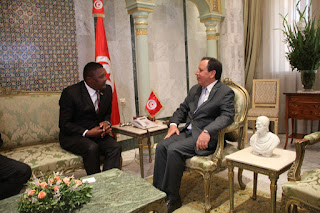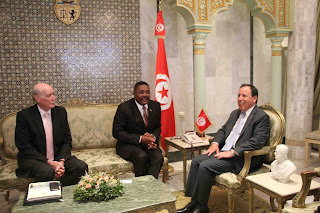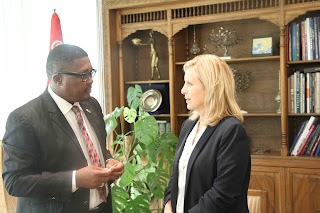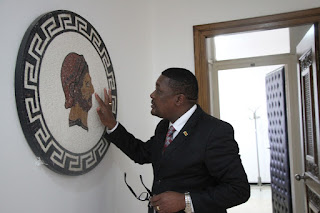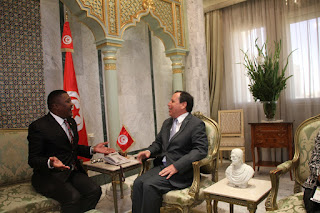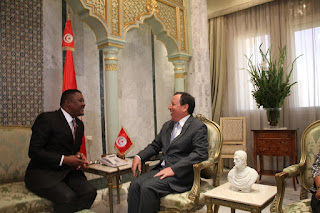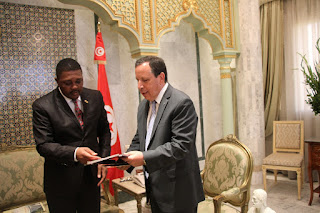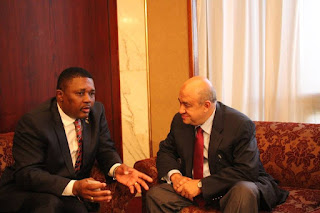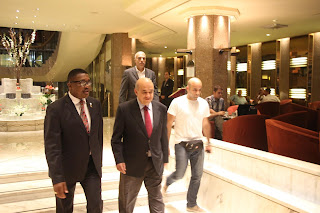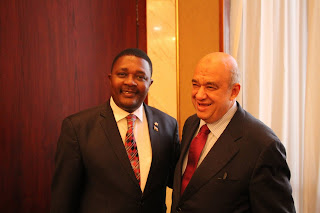
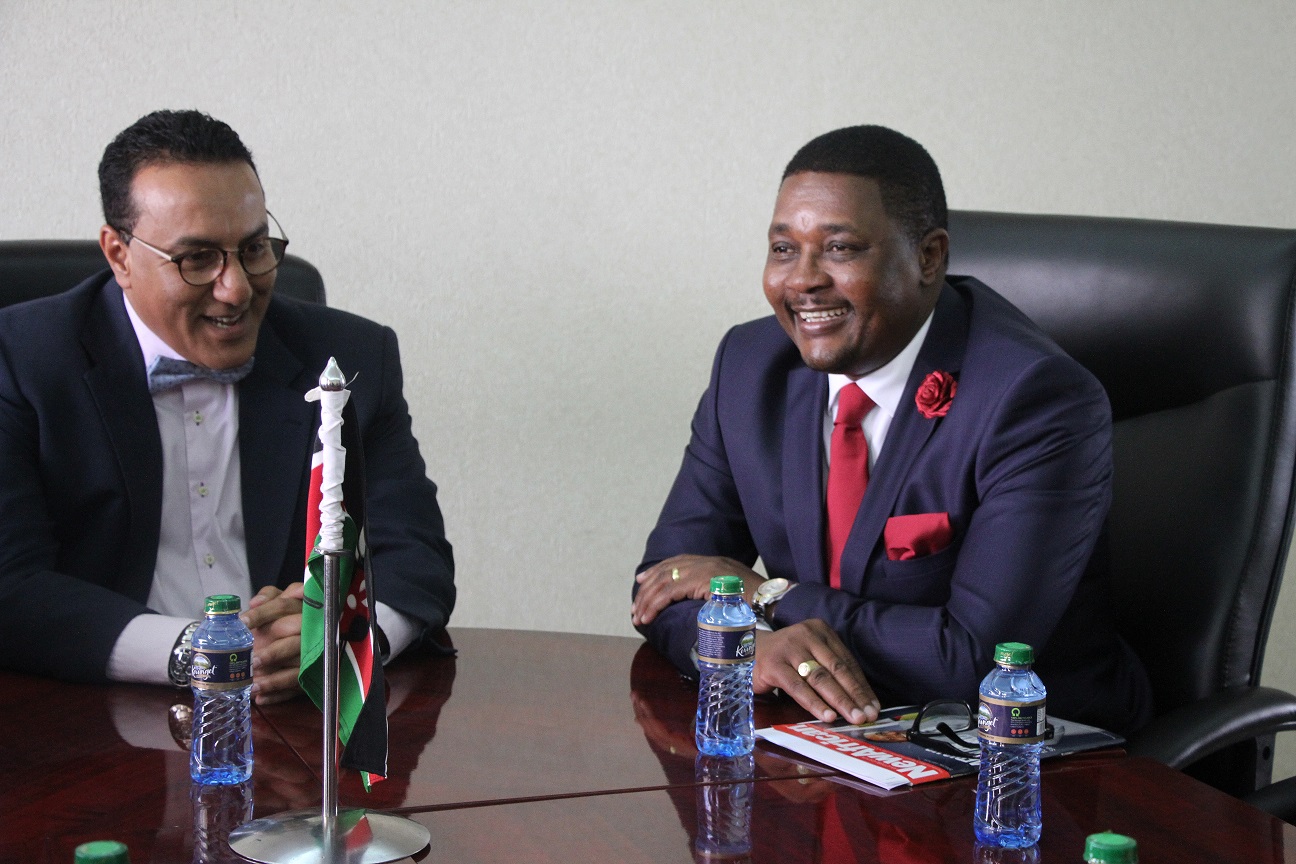
UNWTO Campaign reaches out to Executive Council member Kenya for support
On the final leg of his latest UNWTO campaign tour, Zimbabwe Tourism and Hospitality Industry Minister, Dr Walter Mzembi, arrived in Nairobi, Kenya, for comprehensive discussions with his Kenyan counterpart, Hon Najib Balala.
Kenya is a member of the UNWTO Executive Council and will be one of 32 Council members to vote for the next Secretary General of the UNWTO when the Council meets in Madrid, Spain, in May 2017.
The Minister’s visit to Kenya follows in the wake of the letter sent by His Excellency President Robert Mugabe to all African Heads of State – including His Excellency President Uhuru Kenyatta – seeking their support for Dr Mzembi’s candidature, and the subsequent unanimous endorsement of that candidature by the African Union Summit meeting held in Kigali, Rwanda, in July this year.
Dr Mzembi expressed his gratitude to the Minister and, through him, to His Excellency the President for their support and stressed that if Africa is to realize its ambition to head the UNWTO – the first time in the history of the Organisation – the continent will need to remain united and committed in its support for the AU-endorsed candidate.

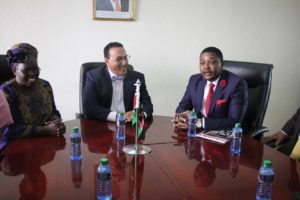
The ministers agreed to remain in close contact going forward and to intensify their cooperation both at bilateral and continental level as well as within the broader UNWTO framework.
At a bilateral level, the Ministers acknowledged that Zimbabwe and Kenya are natural cooperating partners in the tourism sector, and committed themselves to finalise an enabling bilateral Memorandum of Cooperation before the end of 2016.
Apart from intensifying the promotion of tourism between the two countries, the ministers agreed to investigate the possibility of enhanced cooperation in terms of existing air-links and related services between Zimbabwe and Kenya
Enhanced cooperation in the joint promotion of international conferences was also discussed. Within this context, Dr Mzembi highlighted the possibilities for Kenyan investment and cooperation in the development of modern convention and conference facilities in the Victoria Falls Special Economic Zone.
The meeting ended with the Ministers agreeing that Dr Mzembi would visit Kenya again in the near future in order to continue dialogue about enhancing bilateral tourism links and to share views on the future of global tourism under the umbrella of the UNWTO.
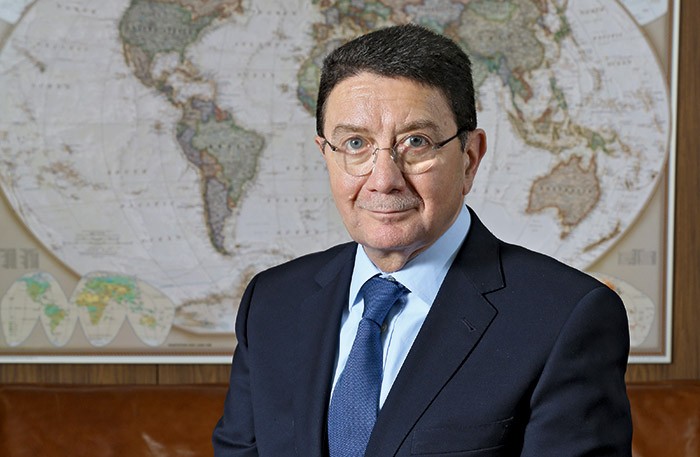
Taleb Rifai speaks out on terrorism and tourism safety
Taleb Rifai, secretary-general of the World Tourism Organization, was interviewed by Elena Sevillano, a journalist based in Madrid, home of UNWTO.
Elena points out Taleb Rifai believes the best way to respond to terrorists is to continue visiting the attacked countries.
In the exclusive interview Elena Sevillano speaks about safety, terrorism, all very real issues facing the global travel and tourism industry. Terror has made tourism to their number one target and enemy.
Jordan’s Taleb Rifai (1949), secretary-general of the World Tourism Organization (UNWTO), takes advantage of every opportunity to highlight the role of tourism as a catalyst for development and a source of wealth. In Sri Lanka, where this interview was held, Rifai stressed how this industry even helps to heal the wounds of conflict such as that experienced by this Asian country as recently as just seven years ago. The conversation, however, drifted towards what is perhaps the greatest current threat faced by the sector: terrorism.
It had been a couple of weeks since the attack at the Turkish airport; the attack in Nice occurred the day after the interview.
Question: Tourists could not go to entire areas in Sri Lanka until 2009 because of the war. How do you open up a country to tourism after a conflict?
In Asia, Vietnam and Cambodia are great examples. I am from the generation that grew up with the Vietnam War and the atrocities in Cambodia, the bloody conflict that gripped the country for so many years. No one could imagine at the time that today Vietnam and Cambodia are associated only with beautiful things. It’s amazing and it was tourism that made it happen. In Eastern Europe, we have the example of Croatia and Slovenia. Croatia was at the centre of a civil war when Yugoslavia was dissolved in the 1990s. Today it receives 12 million tourists. Today, only beaches and beautiful places come to mind: not a trace of the war.
Q: Tourists seek safety when travelling. How do you manage to transform the image as an unsafe place of a country that has suffered a war or an attack?
I always say that what matters, what is most important, is political will. If the government decides that tourism is a good thing for the country, it will go in that direction. It will work. There is no completely safe country in the world. Anything can happen anywhere. That is why the issue of security is a consideration, of course, but it is not all that is on the table. When you travel you think about how expensive, how beautiful or how attractive a place is, what experiences I’ll take back with me and also about safety. It does not determine whether you go or not. They can kill or rob you on the streets of the safest cities in the world. It should not be something that prevents destinations from promoting themselves.
Q: It is true that today something bad can happen around every corner, but now there are countries that appear regularly in the media as targets of terrorist attacks. Think of Egypt, Tunisia, Turkey. How does it affect their tourism industry and their economy?
No country should be classified as safe or unsafe forever, because anything can happen anywhere. It is a global malady.
Q: But travellers do.
That is why we must ask them to please not make that classification. Because today security is no longer something you can guarantee.
Q: Going back to these countries. It must be difficult to fight against the stigma.
Yes, unfortunately some of them have been attacked more than once and seem to have become targets of some of these terrorist groups. The effect has been always been dramatic and immediate. When something happens in a country, people stop going, but it’s a short period. Experience shows us that recovery is quick, especially in countries with a long history and experience in welcoming travellers. Turkey, Egypt, Tunisia. Does it affect them? Of course it affects them. For how long depends on them. The recovery process can be really fast. Egypt has been a tourist destination for 7000-8000 years. That may change for a few months or a few years, but it will come back.
Q: Is there an example of good practice after such an event?
: What happened in Turkey a few weeks ago was highly significant. When Ataturk Airport was attacked, two things happened that give food for thought. The Turkish authorities put the airport into operation in 8 hours, as active as ever. It was an excellent example. If you compare it to other incidents, airports were closed for days, weeks. That’s a good way to respond to terrorists. You want to hurt us? You will not succeed. We are operational in less than 24 hours. Determination and political will are key.
Russia’s reaction. We are accustomed to traditional tourism generating countries that immediately impose travel restrictions. Germany, England, France, Russia, Sweden. They tell their nationals: don’t travel to these areas. Russia did exactly the opposite. That same afternoon it lifted the ban and said we want our citizens to travel there.
Q: So, is that what needs to be done then?
: It is the best way to respond. Because—think about it—that’s what the terrorists want. They attack airports, hotels, beaches, restaurants… They attack tourist infrastructure, like it or not, because they know that is where it hurts. They cause economic and political damage because they damage the country’s image. When they do it, they expect people to stop travelling to Turkey or Egypt. So the only way to defeat them is to continue travelling to those countries. Send the message that we are back in operation. In fact, the places that have been attacked are the safest in the world right after because security is even greater. To countries I say: Please do not rush to issue advisories against tourism. Let’s not fall into that trap.
Q: Has the perception of insecurity following the attacks contributed to the tourism records of Spain?
A: I don’t agree with that approach. Our figures prove that what we are assuming, that Spain benefits from the misfortunes of others, is not correct. All the tourists lost in the three countries are no more than 2.5 million. If they all decided to go to Spain, which is impossible because they go to other places it still would not explain the growth, which is three times higher. Yes, there may be an effect, but it is not factor in why tourism is growing in Spain. To assume that Spain is doing well because others are doing poorly is unfair to Spain. Spain is performing well because it is doing a good job, not because others are suffering. Perhaps 10% or 15% of the tourists of these countries may go to Spain, but that does not explain the increase.
Q: Can we handle so much tourism? Barcelona has warned on several occasions that it has trouble managing it. Why?
First of all, you cannot say no to tourism. I think in Barcelona sufficient efforts are not being made. As a tourism destination, you have to create other attractions that pull tourists from the city centre, give them alternatives, create new destinations. Barcelona can do better, and I hope this is not understood as a criticism.
Q: How is Ana Botella working in your organization after you took her on board?
Very well. She is a very active person and did a lot for the tourism sector when she was mayor. I did not recruit her due to political affinities but rather for her enormous experience.
: Has she already produced a report?
Yes, and she is preparing a meeting of the network of mayors of tourism cities.
“We live in the era of travel,” you said at the conference in Sri Lanka. How does that translate into figures?
In 1950, after the end of World War II, and when the world was beginning to go back to normality, there were only 25 million international travellers crossing borders, according to our data. In 2015 we counted 1.184 billion. We are talking about 65 years over which we can see how much the number of travellers has multiplied. It’s tremendous. People are defying borders and travelling more and more. And it is not just the numbers, it’s the places. There is no longer any place that people do not travel to. We travel to the North Pole, the South Pole, the Amazon, deserts. The world has opened up in an incredible way. And it happened so fast that we are still adapting. It is something like what happened with the industrial revolution, 200-250 years ago. People were not aware of living in that era until a hundred years later. I am sure that in 40, 50, 60 years people will look back and characterize our time as the era of travel.
I think, historically, this is the time for people to move. Before, it was things that moved, trade was created, after that capital moved, with the creation of financial institutions, then information, now is the time for people to physically move, which is why I call it the era of travel.
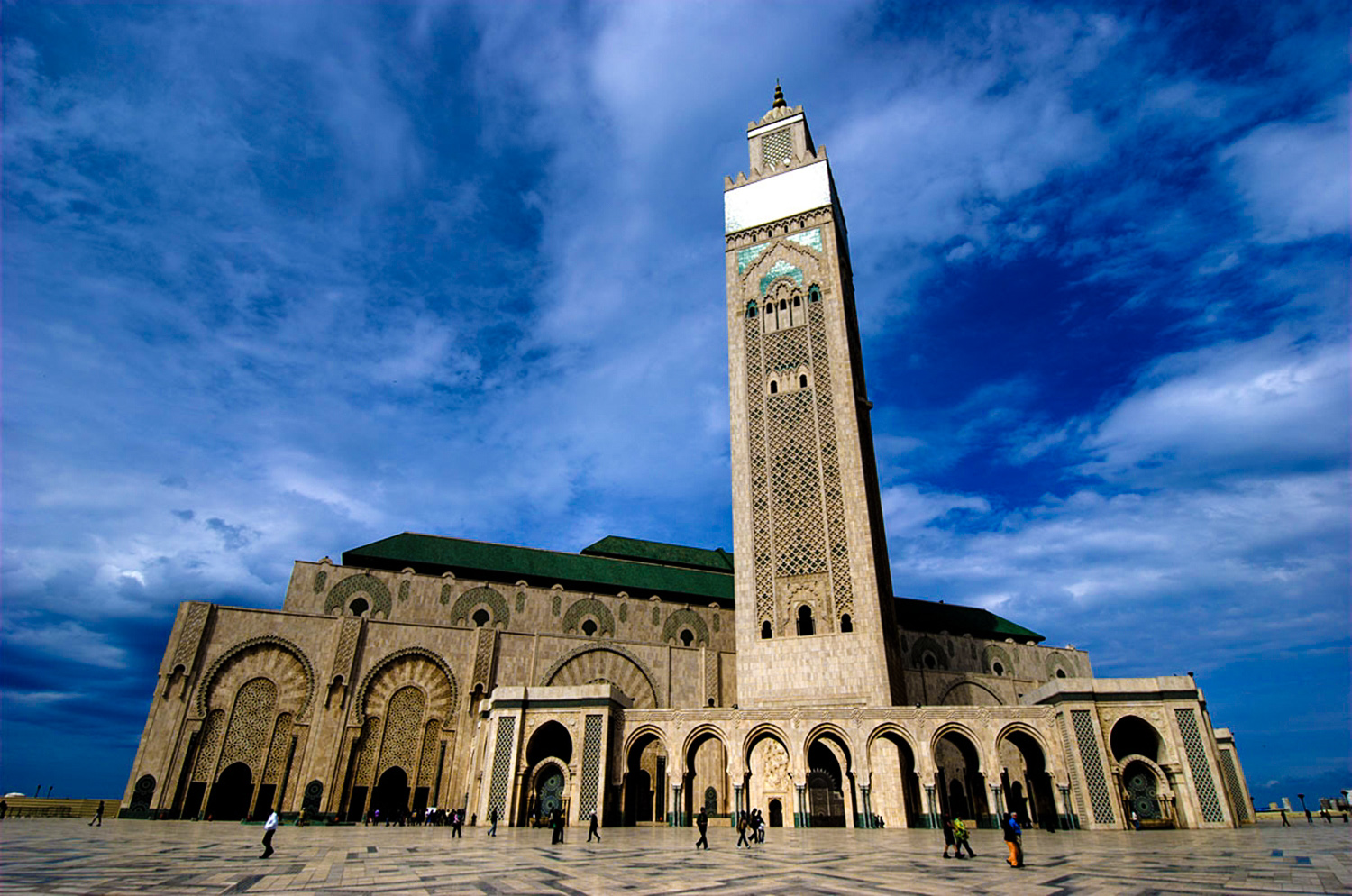
Taking Morocco Tourism to the next level
The Morocco Ministry of Tourism is hard at work creating a strong foundation for its industry. From accommodations to travel agencies, from tour guides to regulations, every link is being forged into a strong tourism value chain.
The Tourism Minister of Morocco, Lahcen Haddad, is rising up to meet the changing desires of tourists and their expectations in the areas of technology, social media, and cultural/eco-tourism offerings. To meet these challenges, Vision 2020 sets out a map to achieve innovative and competitive tourism for the country.
Support and guidance
The Tourism Ministry is providing support and guidance so as to benefit from financial support mechanisms, technically-designed and tailor-made to meet the development needs of tourist facilities. By setting a reference standard, this provides a marker to follow and improve the quality of services.
Tourism stakeholders are able to enjoy a personalized agenda, and pick labels and certifications that are adapted to enhance the attractiveness and strengthen their particular market position. They benefit from a coaching ground for any renovation, expansion, or upgrading of a tourist establishment.
Synergy and cohesion
Tourism representatives can also take advantage of the synergy and cohesion of membership benefits to the National Federation of Hotel Industry and Industry Regional Associations Hoteliere and exchange experiences with industry professionals. Through networking opportunities, they receive coaching and mentoring, and have a good representation of themselves to present before public bodies.
The year 2020 may sound far off into the future, but in reality, it is just three-and-a-half years away from now. As the Morocco Ministry of Tourism continues to roll out Vision 2020, it is moving forward and taking Morocco tourism to the next level.
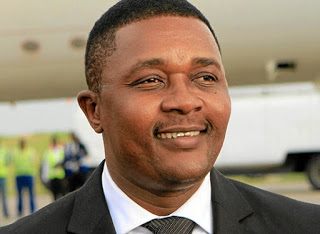
UNWTO Africa Chair Mzembi reaches out to Italy’s minister of cultural heritage and tourism
The earthquake today was very much a shock and strike against the travel and tourism industry in Italy during the peak of their high season travel period.
The outspoken candidate circling the Earth to become the next UNWTO secretary general is showing global leadership again today. Walter Mzembi, who also is the current chair for the UNWTO Commission for Africa (CAF) took the initiative while attending an event in Kenya to reach out to the people of Italy and their tourism industry leaders.
He had a letter delivered to His Excellency Dr. Dario Franceschini today, following the devastating earthquake claiming more than 120 lives in Central Italy.
The letter reads:
His Excellency Dr Dario Franceschini
Minister of Culture and Tourism
Ministry of Culture and Tourism
Via dell Collegio Romano
27 Roma 00186
ITALY
Your Excellency,
I write, on behalf of all members of the UNWTO Commission for Africa (CAF) – which I have the honour to Chair – to extend to you our collective heartfelt sympathy and most sincere condolences for the tragic loss of life and terrible injuries inflicted upon the Community of Amatrice and many other towns and villages within the Umbria region of Central Italy, following the devastating earthquake of 23 August.
No words can bring adequate comfort to those who have lost loved ones or whose homes and livelihoods have been destroyed by this disaster, but please know that you are all in our thoughts and prayers at this most challenging and difficult of times.
You will recall, Excellency, during the 60th Regional Commission for Europe, I highlighted, on behalf of Africa, the need to expand the definition of insecurity to include natural disasters of different kinds prevalent in our different regions – which often claim more lives than conventional threats such as terrorism – and, in this regard, the need for us to adopt a holistic mitigation strategy.
In the hope of meeting you again in the near future and of continuing our discussion on the search for effective mitigation solutions, I once again extend my deepest condolences and sympathies to all those affected by the recent earthquake.
Please also accept, Excellency, my most sincere best wishes.
Yours faithfully,
Walter Mzembi (Phd)
Minister of Tourism and the Hospitality Industry
Republic of Zimbabwe
Chairperson
UNWTO Commission for Africa
c.c. Her Excellency Dr Dorina Bianchi
Deputy Minister of Culture and Tourism
Ministry of Culture and Tourism
Rome – Italy
c.c. His Excellency Dr Enrico de Agostini
Ambassador of the Republic of Italy
Harare – Zimbabwe
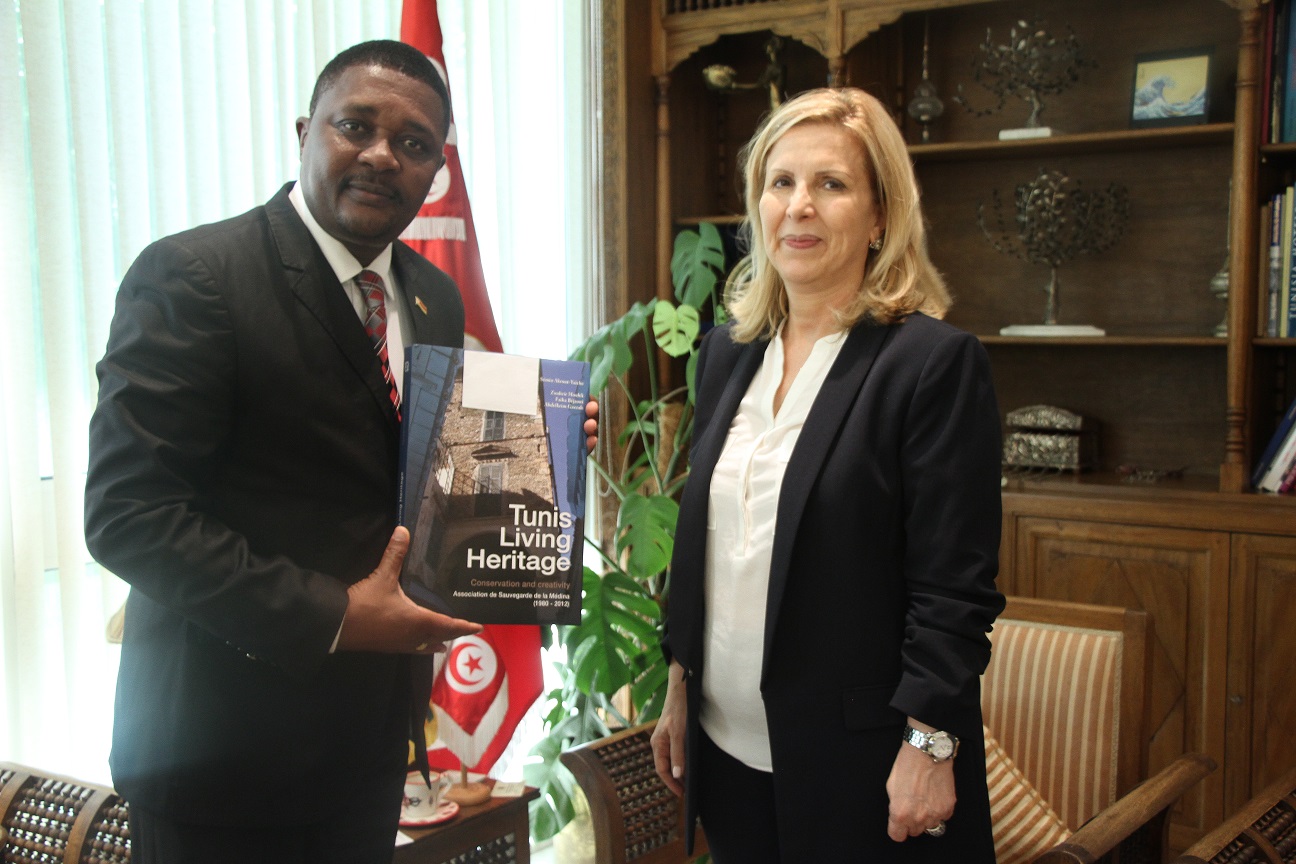
UNWTO candidate Mzembi leaves Tunisia deeply impressed
Tunisia is deeply impressed by Mzembi’s vision for global tourism development.
Hot on the heels of his successful two-and-a-half-day visit to Egypt earlier this week, Zimbabwe Tourism Minister Walter Mzembi has brought his UNWTO campaign effort to Tunis, capital city of the Republic of Tunisia – the latest stage of his current outreach program.
Like Egypt, Tunisia is also a member of the UNWTO Executive Council. Its support, therefore, will be crucial come election-day in May 2017, when the Council gathers in Madrid, Spain, to decide who will become the next Secretary General of the organization when the incumbent, Dr. Taleb Rifai a Jordanian national, stands down.
Warmly welcomed by his Tunisian hosts, Dr. Mzembi first met with the Minister of Foreign Affairs, Mr. Khemais Jhinaoui, who was accompanied by senior officials from the Political and Economic Affairs Departments of the Ministry.
Tracing the evolution of the fraternal relationship which exists between Tunisia and Zimbabwe, Minister Jhinaoui expressed his delight at receiving Dr. Mzembi and welcomed the opportunity for a detailed exchange of views focusing on how the two countries could work together in the future to further strengthen already existing ties, including the tourism sector.
Minister Jhinaoui congratulated Dr. Mzembi on the progress made thus far with regard to his bid to secure the post of Secretary General of the UN World Tourism Organization, and noted the strong boost given to that bid by the recent AU-Summit endorsement of his candidature.
Minister Mzembi gave a detailed presentation of his vision for the future trajectory of the UNWTO should he be elected to the post of Secretary General. Both ministers agreed on the positive impact his election would have, not only in terms of mainstreaming tourism within the continental African development agenda but, more broadly, in terms of injecting fresh impetus and focus on addressing the serious challenges which, today, confront the global tourism industry.
Minister Jhinaoui complimented Dr. Mzembi for the depth and clarity of his vision and for the evident passion and dynamism underpinning that vision. He said he would immediately share the substance of their discussion with the Tunisian Prime Minister and the Head of State, His Excellency, President Beji Caid Essebsi.
The two ministers agreed to keep in close contact as the UNWTO election process enters the formal nomination phase, leading towards the primary vote to be cast by the by the 32 Executive Council members when they meet in Madrid, Spain, in May 2017.
Later in the day, Hon. Minister Mzembi met with his Tunisian counterpart, Ms. Salma Elloumi Rekik, the Minister of Tourism and Handicrafts.
He warmly congratulated her on her re-appointment, just the previous day, to the Tourism and Handicrafts portfolio – the first African colleague to do so.
The two ministers agreed that every effort should be made to pursue the path of greater cooperation between Tunisia and Zimbabwe, in the tourism sector. As an immediate next step and so as to set out a concrete basis for such intensified cooperation in the sector, the ministers agreed to rapidly finalize the Memorandum of Understanding (MOU) they originally initiated in 2014.
The ministers then held detailed discussions on the current status of global tourism, highlighting the various challenges which confront the industry today and agreeing on the important role UNWTO must continue to play in mobilizing and coordinating the international response to those challenges.
The ministers spoke at length about the current and future development of tourism on the African continent and of the need for African countries to intensify their efforts, at the national, regional, and continental level, to ensure that in each country and, more broadly, within the AU’s Agenda 2063, “Tourism” is accorded its rightful status as a powerful engine for rapid, effective socio-economic development across the continent.
With specific regard to Tunisia, the ministers noted the serious impact recent terror attacks and the resultant heavily negative travel advisories had had upon foreign tourist arrivals, especially from Tunisia’s traditional source markets in western Europe.
Dr. Mzembi agreed that finding an effective approach to the issue of tourism and security was absolutely essential to the future well-being and development of global tourism. It counts not only as a vehicle for more inclusive socio-economic development, but as an effective tool to build bridges between peoples and cultures, to promote greater international understanding, and to contribute towards global peace and harmony.
“In order to fulfill its true destiny, UNWTO needs to be fully universal in terms of its membership. A number of major players remain outside the organization. We need them inside with us, especially if we are serious about promoting a meaningful discussion and seeking effective solutions to the burning issue of the day – that of tourism and security and related issues such as unilateral, unfair, and often excessive travel advisories which can have a devastating effect upon tourism, especially in developing countries,” said Minister Mzembi.
Minister Rekik expressed her appreciation for the vision outlined by the mercurial engineer in terms of the development of the global tourism industry and confided that her colleague, the Foreign Minister of Tunisia, had telephoned her immediately after his meeting with him to record how impressed he had been with the clarity and farsightedness of the minister’s vision, should he be elected to the post of Secretary General, to continue and build upon the fine legacy of Mr. Taleb Rifai.
From Tunis, Hon. Minister Mzembi travels to Nairobi, Kenya, venue for the 6th Tokyo International Conference on African Development (TICAD VI) where he will have an opportunity to engage and interact with a range of African Heads of Delegation as well as with senior officials of the Japanese Government.
Held every three years and alternating between Japan and the African continent, the TICAD forums provide an opportunity for African leaders to engage directly with the political leadership of Japan and, in coordination with the African Union Commission, the UNDP and the World Bank. All of them are TICAD co-organizers. The minister is seeking to align Japanese development support and, wherever feasible, Japanese private sector engagement (itself often supported by or supplemented by Japanese Government funding) with Africa’s agreed continental development agenda(s) across a variety of sectors.
Since TICAD IV (Yokohama, 2008), tourism development has been a sub-pillar of Japan’s broad cooperation matrix with African countries.
Japan, like China and a number of other Asian countries, is actively promoting out-bound tourism and, via institutions such as the Japan Tourism Agency and JATA, is seeking new, secure and safe travel destinations for its nationals. Africa certainly features in Japan’s considerations, and TICAD provides an appropriate and effective platform for a collaborative dialogue towards realiing the undoubted potential of greater tourism exchanges between Japan and Africa.
Zimbabwe, which already benefits from a steady flow of tourist arrivals from Japan, albeit almost entirely focused on the Victoria Falls, is well placed to take advantage of Japan’s focus on out-bound tourism and the possibilities of enhanced Japanese financial and technical support, via TICAD, for tourism development.
In addition to seeking the endorsement of the Japanese Government for his UNWTO election bid, Hon. Minister Mzembi will be seeking to encourage further Japanese tourist travel to Zimbabwe.
With its impressive and varied tourist product and given the general peace and tranquillity which prevails across the entire country, and given also the burgeoning relationship between Japan and Zimbabwe – evidenced by the invitation extended by Prime Minister Shinzo Abe to His Excellency President R.G. Mugabe, to make an official visit to Japan in March this year – it is expected that this third and final leg of Dr. Mzembi’s current travels will prove to be as successful as the first two have been.
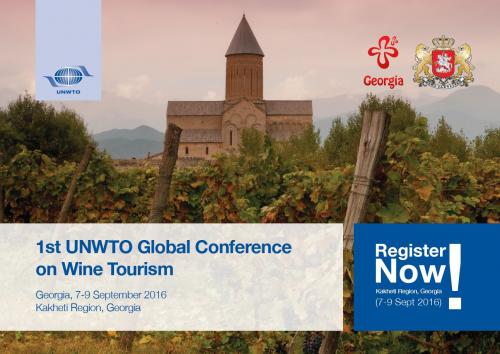
UNWTO Wine Tourism Conference gathers experts from around the world
The World Tourism Organization (UNWTO), in collaboration with the Georgian National Tourism Administration, is organizing the 1st UNWTO Global Conference on Wine Tourism in the Kakheti wine region of Georgia on 7-9 September 2016.
“Georgia’s unique wine-making traditions date back 8,000 years and are considered by UNESCO as intangible heritage, making the country an ideal host for the Global Conference on Wine Tourism. The country’s recent success in attracting a growing number of tourists, and its development of tourism products, branding and marketing, combine to present an excellent platform for sharing best practices, experience and knowledge,” said Dimitry Kumsishvili, Vice-Prime Minister and Minister of Economy and Sustainable Development of Georgia.
“Wine tourism is a growing segment with immense opportunities to diversify demand. In the case of Georgia, the segment’s potential is well known and we are very pleased to be holding the first UNWTO Global Conference on Wine Tourism in the country”, added Taleb Rifai, UNWTO Secretary-General.
Gastronomy and wine have become key components of a culture and lifestyle experience of any destination, and a growing travel motivation. To foster the development of this segment, in September 2015 UNWTO launched the UNWTO Gastronomy Network.
In this context, UNWTO is currently developing a Wine Tourism Prototype in Spain. The Prototype includes an analysis of wine tourism, in comparison with other tourism segments, and the design of an innovative product development model focused on the integration of the wineries into the cultural, economic, social and environmental heritage of their area of influence. The final results of this project will be presented at the conference.
The Conference will have a unique and dynamic format with three sessions to be held in different wineries across the Georgian region of Kakheti.
Speakers at the conference will include: Mr. Giovanni Mantovani, CEO, VeronaFiere and creator of VINITALY, (Italy); Ms. Janet Dorozynski, Trade Commissioner, Canadian Wine, Beer and Spirits and Tourism, Trade Sectors Bureau (BBI), Global Affairs Canada (Canada); Mr. Mike Veseth, Wine Economist, Professor Emeritus of International Political Economy, University of Puget Sound (United States); Mr. Gabriel Fidel, Wine Tourism Consultant (Argentina); Ms. Ayana Mizawa, Chief winemaker, Chuo Budoshu Co., Ltd., Grace Wine (Japan); Mr. Pedro Vargas, International Projects Director, Leading Brands of Spain Forum (Spain); Mr. George Chogovadze, Head of Georgian National Tourism Administration (Georgia); Mr. Levan Davitashvili, Deputy Minister of Agriculture of Georgia (Georgia); Mr. Patrick Honnef, Winemaker, Viticulturist, CEO of Château Mukhrani, Georgia (Georgia); Mr. John H Wurdeman V, Owner of Pheasant’s Tears (Georgia); Mr. Santiago Vivanco, Director, Vivanco Museum of Wine Culture (Spain); Mr. Donald Hawkins, Eisenhower Professor, George Washington University (United States); Ms. Paula Sousa, Marketing & Tourism Sales Director, Quinta Nova N. S. Carmo (Portugal) and Ms. Zaida Semprun, Wine Tourism Commercial Manager, Freixenet Group (Spain).

Global tourism resilient to terrorism, Brexit and further macroeconomic challenges
Global Travel & Tourism continues to register strong growth despite challenges from terrorism, political turmoil, global economic developments, and the Brexit decision, according to new research by the World Travel & Tourism Council (WTTC).
The update of WTTC?s Economic Impact Reports 2016 shows that, despite the many challenges Travel & Tourism has faced in the first six months of 2016, the sector is still expected to grow by 3.1%, outpacing global economic growth forecast at 2.3%.
The regional outlook for direct Travel & Tourism GDP in 2016 shows that:
- South Asia leads the growth at 5.9%, driven by strong economic prospects in India.
- Latin America will be the worst performer, with an anticipated decline of 0.9%, driven by weakness in Brazil.
- Northeast Asia and Southeast Asia are expected to show solid growth at 4.7% and 4% respectively, stimulated by China growing at 6.3%.
- North America will perform well, with forecast growth of 3.1%.
- Europe will be challenged by lower visitor spend, but will still grow by 2.2%.
While the global picture remains positive, the outlook for some countries has deteriorated since WTTC?s last forecast in March 2016:
- In France, the sector?s direct contribution to GDP is still growing, but the forecast has been reduced from 2.9% to 1.1%, due to macroeconomic downgrades in other European countries, and compounded by the recent incidents in the country, including the atrocity in Nice.
- In Turkey, growth in Travel & Tourism?s direct contribution to GDP has been reduced further from -0.2% to -3.2%, due to the spate of terror attacks, the diplomatic dispute with Russia, the failed coup, and proximity to the Syrian conflict.
- In Brazil, thesector is still expected to contract, despite the positive effect of the Olympics. Growth has been downgraded from -0.9% to -1.6%, as a result of the political turmoil and weak macroeconomic performance.
The report includes a focus on the impact of the Brexit decision. This shows that Travel & Tourism in the UK is expected to hold up well in 2016 with growth of 3.6%. Weaker domestic spending growth, and a projected drop in UK outbound holidays of 3%, will be offset by higher spending in the UK by international visitors as a result of the favourable exchange rate.
David Scowsill, President & CEO, WTTC, said: ?Our update report highlights the resilience of travellers and the robustness of our sector, as tourism continues to outpace global economic growth by nearly 1%. Whilst we should not downplay the impact of incidents or turmoil at individual country level, on a macro-economic level we continue to register strong growth.
It is important to remember that tourism is a force for good. It brings tremendous social and economic benefits to countries and connects people from different cultures and backgrounds. We call on governments to continue to focus on the economic and social benefits of Travel & Tourism, and to work together with the private sector to combat some of the challenges we face.?
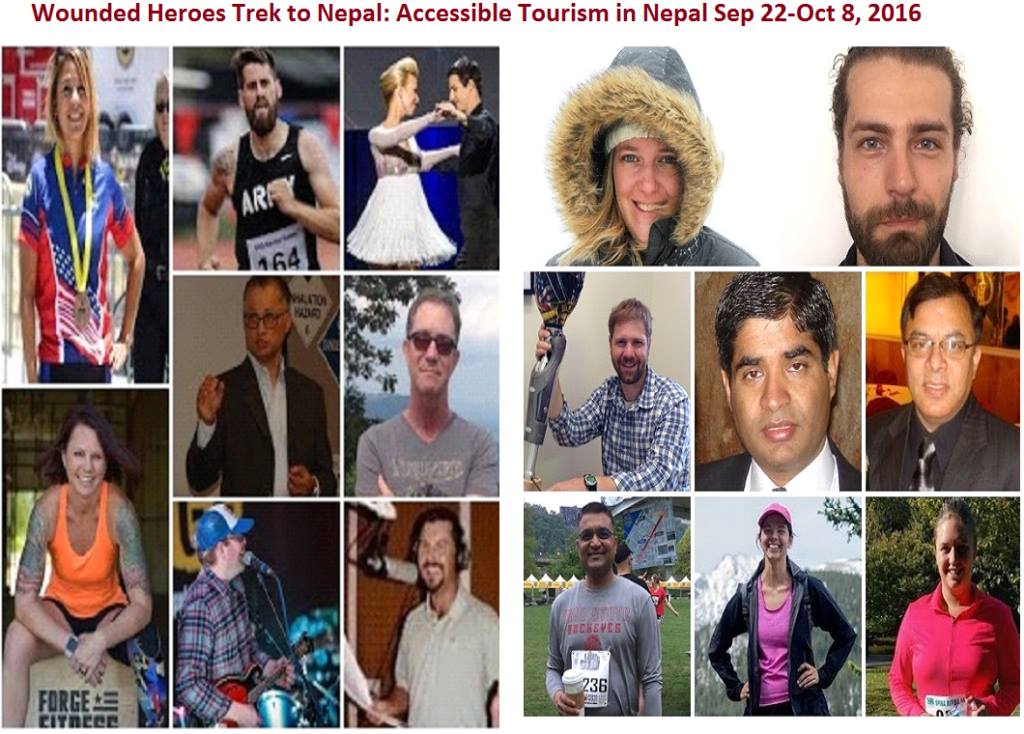
Nepal brings accessible tourism to World Tourism Day 2016
Ever since its inception, World Tourism Day is celebrated on September 27 to foster awareness among the international community of the importance of tourism and its social, cultural, political, and economic value. As the official day set aside in the United Nations Calendar, the celebration seeks to highlight tourism’s potential to contribute to reaching the Sustainable Development Goals (SDGs), addressing some of the most pressing challenges society is faced with today.
Accessible tourism for all is about the creation of environments that can cater to the needs of all of us, whether traveling or staying at home due to a disability, even temporary, or to families with small children, or the ageing population, at some point in our lives, sooner or later, we all benefit from universal accessibility in tourism.
The United Nations World Tourism Organization (UNWTO) strongly encourages nations to make all tourist facilities, products, and services accessible for everyone. This accessibility is crucial to attain sustainable tourist policies. The combined effort marks the celebration of World Tourism Day 2016 under the theme “Tourism for All – Promoting Universal Accessibility.”
Washington DC-based International Development Institute in collaboration with the Soarway Foundation, Operation Namaste, and Four Season Travel and Tours in Kathmandu, Nepal, has put together an Explore Himalayas 2016 program in September 2016. According to the World Health Organization (WHO), 15% of the world’s population (1 billion people) is estimated to live with some form of disability.
The inclusive tourism movement in Nepal is pleased that the “Wounded Heroes Trek of Hope to Nepal” program is on the list of events by UNWTO, celebrating World Tourism Day. The trek is the only such project to be recognized in Nepal – and one of only three throughout South Asia. This gives much-needed hope and a moral boost to all involved in turning accessible tourism into a reality in Nepal. The Wounded Heroes Trek of Hope to Nepal hopes to provide international attention to the country to boost tourism, thereby positively moving the country forward economically.
The program takes a team of 19 wounded heroes, which includes a team of medical professionals and a team of writers, as well as journalists to Nepal with the hope of inspiring 500,000 people with disabilities in Nepal by creating awareness for social responsibility and making Nepal accessible for people with disabilities during the rebuilding of Nepal after the 2015 earthquake. The program will take this team to Kathmandu, Nagarkot, Pokhara, the Poonhill trek, and Chitwan.
Scott DeLisi, former US ambassador to Nepal, who is now Executive Director of the Soarway Foundation, said: “It’s about inclusive tourism. By making Nepal an accessible tourism location we can build an economy. We can help them build a future that they can face with confidence rather than fear.”
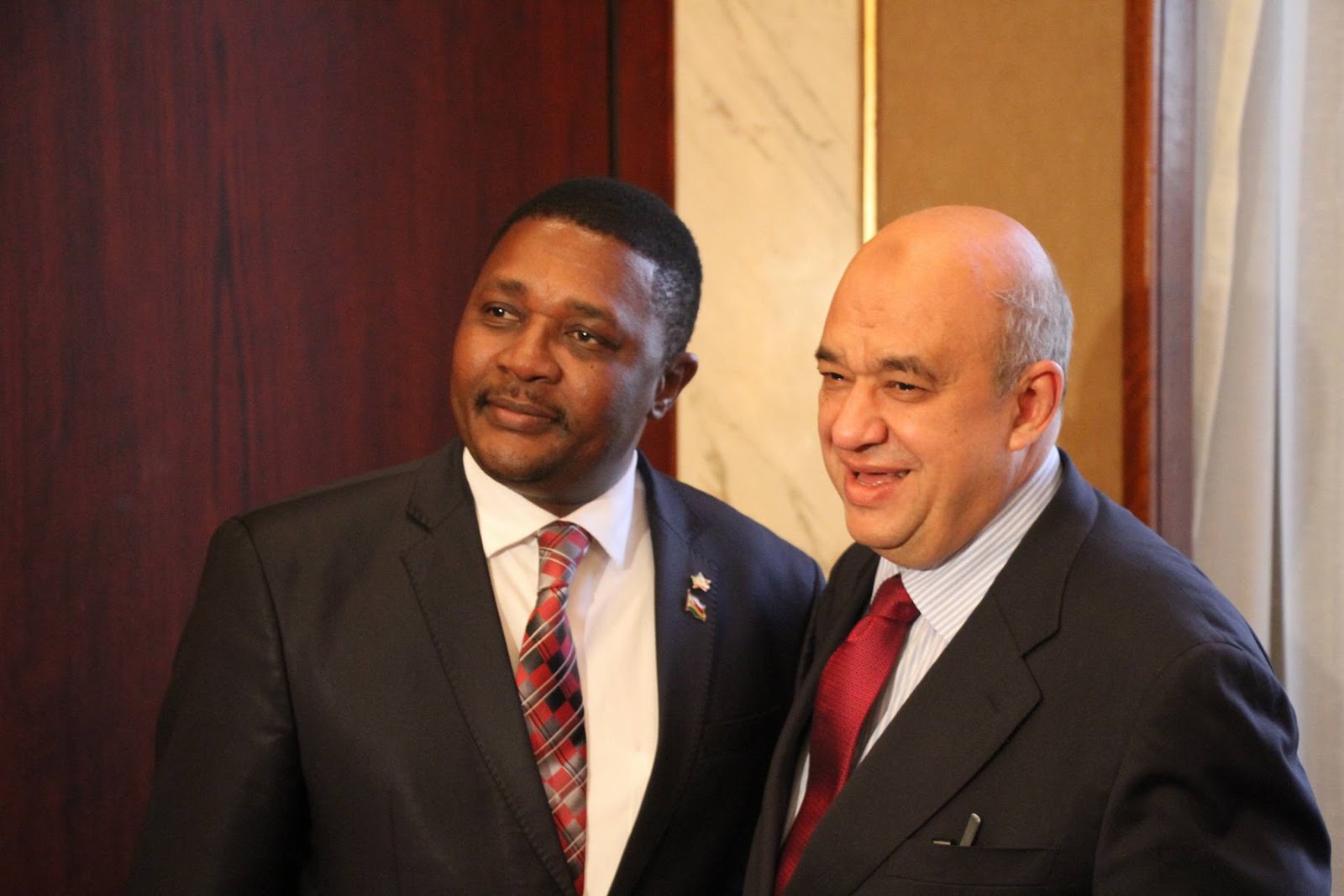
Egypt and Zimbabwe tourism cooperation goes to higher levels
Zimbabwe’s Minister of Tourism and Hospitality Industry, Dr, Engr Walter Mzembi who is in Cairo, Egypt on his UNWTO campaign trail, had a fruitful engagement with his Egyptian counter-part His Excellency Mohamed Yehia Rahed.
The two Ministers discussed, among other key strategic issues, the implementation of the Memorandum of Understanding (MoU) on Co-operation in the field of Tourism signed between the two countries in December 2014.
Speaking after the meeting, Minister Mzembi revealed that they had agreed on the setting up of the Joint Tourism Technical Committee (JTTC), which will be instrumental in the operationalisation and full implementation of the MoU.
“We are definitely excited about our engagements here and one key thing that was at the epi centre of our discussions was the urgent need to set up a Joint Tourism Technical Committee that will spearhead the operationalisation of our MoU with Egypt. There are various programmes that will be implemented in the context of our MoU. One such key programme is the agreed Egypt Tourism Week to be held in February 2017 in Zimbabwe and the Zimbabwe Tourism Week in Egypt in April 2017 which, essentially, is a reciprocal event”, said Minister Mzembi.
The Minister added that, “this initiative, apart from cementing relations between the two countries, helps to boost tourism promotion and enhances cultural ties that are key in sustainable tourism development as this will be undertaken by tour operators, travel agencies and the media, among other key stakeholders”.
The Egyptian Minister of Tourism His Excellency Mohamed Yehia Rahed said his government is keen to see the full implementation of the bilateral tourism pact.
“We are happy to be hosting Minister Mzembi and his delegation in Egypt. There is indeed need to advance close cooperation especially in the field of tourism as espoused in our signed MoU. Africa must do more in the areas of joint marketing and promotion activities if we are to increase our market share in terms of tourism global arrivals,” said His Excellency Rahed.
The meeting also discussed how Egypt has successfully managed to sustain its tourism industry, which is a major contributor to the economic growth of this influential North African country. This has successfully happened against the backdrop of residual concerns about security. It is an experience that could be shared with others on the continent and beyond.
The two Ministers also agreed to work assiduously towards an early resumption of direct air-links between Cairo and Harare as this is largely viewed as a critical success factor in spurring tourism growth in both countries.
Egypt is the headquarters of the Arab League, a very strategic organization of Arab states which has enormous influence on all its membership from Africa to the Middle East.
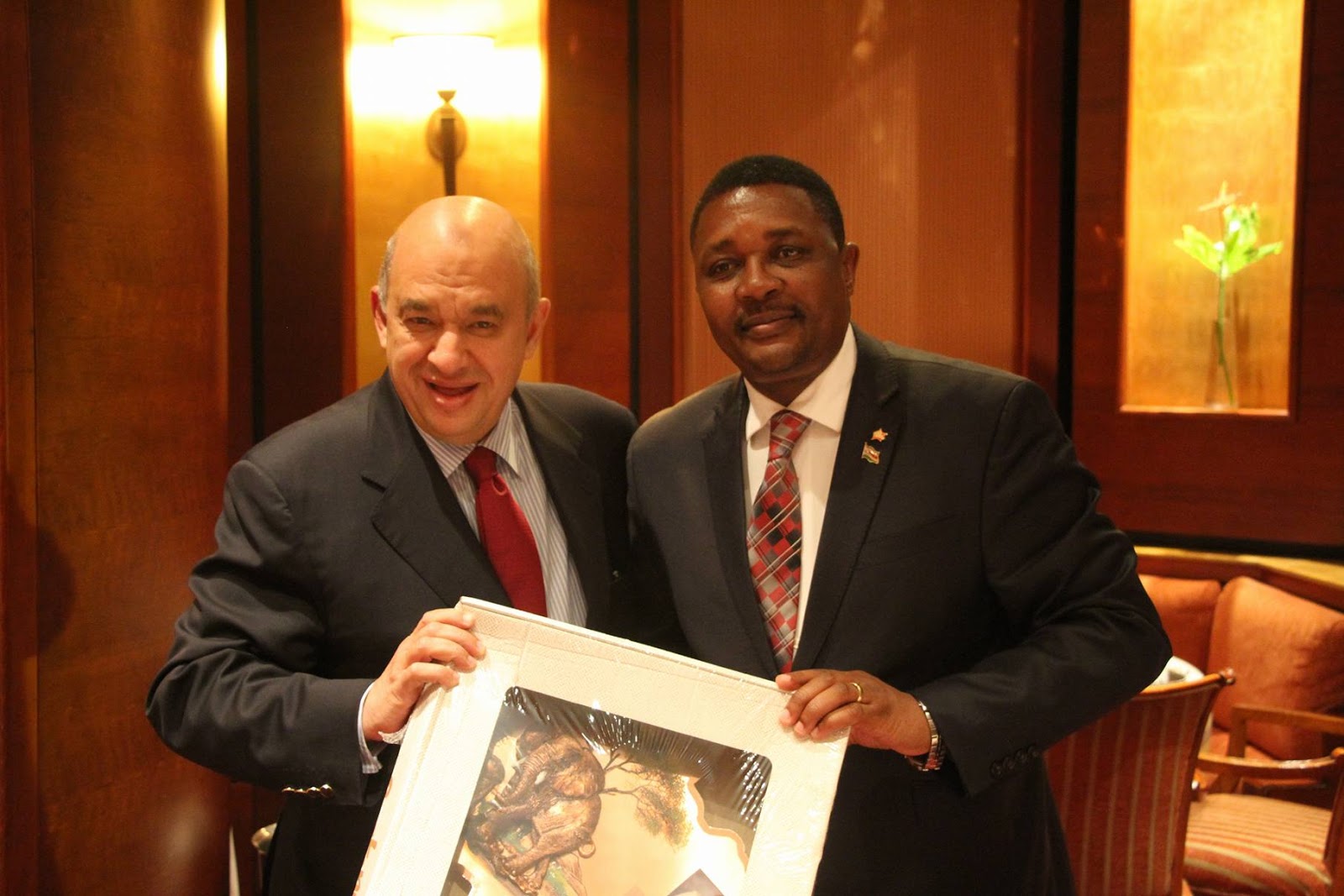
His run for the highest office in tourism makes this minister of tourism unstoppable
Sugar Chagonda, who is in charge of Public Relations for Zimbabwe Tourism and his currently traveling with the Zimbabwe Minister of Tourism Dr.Engr Walter Mzembi posted this paragraph to his Facebook. He heard His Excellency, Mr Mohamed Yehia Rashed, the minister of tourism for Egypt saying: “I must congratulate Dr Mzembi for his dexterity and charm that saw him winning the hearts and minds of the Egyptians. I feel humbled to be part of his winning Tourism team”.
The Egyptian minister apparently mentioned this yesterday during a meeting with his counterpart from Zimbabwe.
Mzembi has been traveling the globe in his bid to become the highest leader in world tourism. The Zimbabwe Minister of Tourism, Walter Mzembi, who is working to secure the post of Secretary General of the United Nations World Tourism Organization (UNWTO) received yet another further boost when he recently received the full backing of the Egyptian Foreign Minister, Hon. Sameh Shoukry.
Egyptian Minister Shoukry assured Minister Mzembi of his support, emphasizing that as a committed member of the African Union, Egypt was bound by the unanimous decision taken by African Heads of State and Government at the recent AU Summit in Kigali, Rwanda, to endorse him (Minister Mzembi) as Africa’s candidate for the top UNWTO post.
“Egypt is committed and bound by the AU resolutions, particularly on the candidature of Dr. Mzembi. We want to assure him of our support,” said the Egyptian Minister of Foreign Affairs.
Minister Mzembi also met with Dr. Moushira Khattab, Egypt’s former Minister of Family and Population and now the country’s candidate for the post of Director General of the United Nations Educational, Scientific and Cultural Organization (UNESCO).
Dr. Khattab’s candidature for the top UNESCO post was also unanimously endorsed by the African Union at the recent Kigali Summit.
The two African candidates held detailed discussions yesterday on the evident synergy and potential for close coordination between UNWTO and UNESCO in terms of bringing people together; promoting deeper understanding and awareness between and among different cultures; and how, working more closely together, the two organizations could contribute more positively towards bridging divisions between peoples and nations.
The two candidates agreed to maintain close and regular contact with regard to the conduct of their respective campaigns and to work assiduously in support of each other as aspiring African candidates to positions of leadership within the broad United Nations family.
Egypt sits in both the African Union (AU) and the Arab League, hence its influence on countries on both sides of the divide. Currently, she is the chair of the UNWTO Executive Council which is expected to seat as a nomination court to receive candidatures from member states interested in fielding their nationals as candidate for the post of UNWTO Secretary General at its 104th meeting slated for October 28 to November 2, 2016, in Luxor, Egypt.
Minister Mzembi is due to leave Cairo on Saturday for Tunisia which, like Egypt, is a member of the Executive Council of the UNWTO. It is the 32-member Executive Council which, at its meeting in Madrid, Spain, in May, 2017, will elect the next Secretary General of the organization.
The current UNWTO Secretary General, Dr. Taleb Rifai, a Jordanian national, is due to stand down from the post at the end of 2017.
If elected, Minister Mzembi will take up his post of Secretary General of the UNWTO at the organization’s headquarters in Madrid, Spain, in January, 2018.


